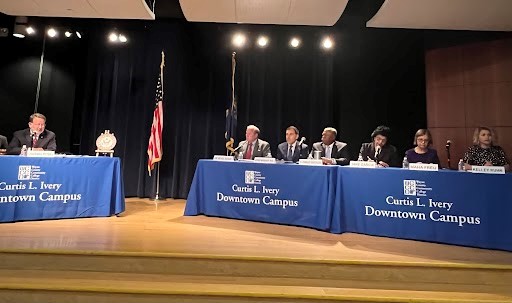VIDEO: Peters Convenes Field Hearing in Downtown Detroit to Examine Impacts of 2020 Census on Michigan
Peters Heard from Witnesses Including Mayor Duggan, Public Policy Experts, and Representatives of Community Organizations
DETROIT MI – U.S. Senator Gary Peters (MI), Chairman of the Homeland Security and Governmental Affairs Committee, convened a field hearing in Downtown Detroit with Mayor Mike Duggan, as well as policy experts and representatives of Michigan community organizations, on the 2020 Census and its impacts on local communities. Peters and the witnesses discussed 2020 Census challenges in Michigan, the potentially devastating impacts of census undercounts for communities like Detroit, including reduced federal resources for programs that support education, health care and infrastructure. The witnesses also discussed their efforts, supported by Peters, to help get Detroiters counted in the 2020 Census, despite the pandemic and political interference. Finally, the hearing also covered current efforts led by Mayor Duggan and the City of Detroit to challenge their census results through a Census Bureau program that Peters successfully advocated for to allow localities to submit data on miscounted and missed populations.
“Every census is a monumental task and the 2020 Census proved especially challenging due to the public health crisis caused by the COVID-19 pandemic, and attempts by the former administration to politicize the census, which compromised the collection of critical data,” said Senator Peters during his opening statement. “And according to scholars at the University of Michigan and Wayne State University, the 2020 Census likely undercounted Detroit's population by about 8% in certain neighborhoods, a potential undercount of tens of thousands of people. This translates into real challenges for cities like Detroit, leading to decreased funding for services like Medicaid and Medicare, SNAP benefits, Head Start, and more.”
“The facts here are painful and irrefutable. Resources and coordination from the US Census Bureau were intentionally diverted away from Detroit, resulting in the 2020 Census failing to count 50,000 Detroiters. I defy anyone to look at the demand we have for housing in the city right now, the construction cranes in the air and the vacant homes being renovated in our neighborhoods, and believe that Detroit is still losing thousands of its residents each year,” said Mayor Duggan. “All we are asking is for the ability to challenge these numbers with facts and data. I am deeply grateful to Senator Gary Peters for hosting today's field hearing at Wayne County Community College to allow our concerns about the 2020 Census. Now that this information has been entered into the official record, we hope the Census Bureau will take appropriate action to correct this significant undercount.
For text of Peters’ opening remarks, as prepared, click here.
To watch video of Senator Peters’ questions, click here.
To watch video of Senator Peters’ closing, click here.
The Census Bureau has released data detailing the extent of undercounts in the 2020 Census. Data revealed nationwide undercounts for many groups, especially minorities. For example, Black people were undercounted by over 3%, and Latinos by nearly 5% – three times the 2010 undercount. While the Bureau does not tabulate local-level undercounts, a University of Michigan study found that the Census Bureau undercounted households in some Detroit neighborhoods by as much as 8.1%. During the hearing, Peters and the witnesses, including Professor Jeffrey Morenoff who conducted the University of Michigan study, discussed these findings and the potential implications of census undercounts. For example, for every person in Michigan who is undercounted, the state could lose $1,800 in critical federal funding.
The hearing examined aspects of the census including successes and challenges, public engagement and communications, analysis of the census results, and lessons for the U.S. Census Bureau. Peters also discussed his work to fight back against political interference and efforts to undermine the census, as well as his oversight and advocacy for an accurate census amid unprecedented challenges including the COVID-19 pandemic. This includes his efforts to secure sufficient funding for the census and pushing for the Bureau to do more robust outreach to minority, rural, and other “hard to count” communities. Peters also discussed his longstanding efforts to press the federal government to add a category for people of Middle Eastern or North African descent to the federal data gathering standards, including the census. Finally, Peters and the witnesses discussed improvements the Census Bureau can make for the 2030 Census.
The Senate Homeland Security and Governmental Affairs Committee, which Peters chairs, is responsible for conducting oversight of the U.S. Census Bureau. Peters convened a hearing last year with senior federal officials to examine the 2020 Census and how lawmakers can work to improve operations at the Census Bureau. He also led the Senate to confirm the current Director of the U.S. Census Bureau, Robert E. Santos, in 2021.
###
